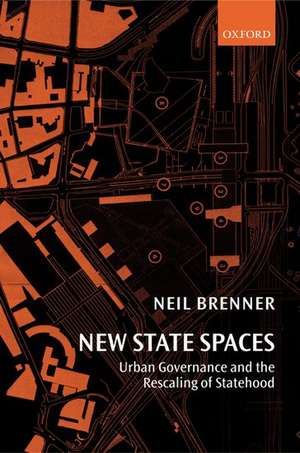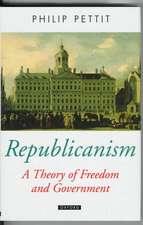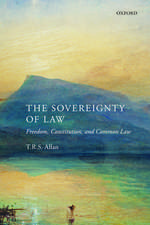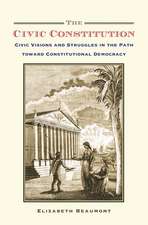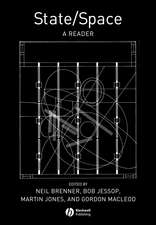New State Spaces: Urban Governance and the Rescaling of Statehood
Autor Neil Brenneren Limba Engleză Paperback – 9 sep 2004
| Toate formatele și edițiile | Preț | Express |
|---|---|---|
| Paperback (1) | 342.95 lei 31-38 zile | |
| OUP OXFORD – 9 sep 2004 | 342.95 lei 31-38 zile | |
| Hardback (1) | 453.35 lei 31-38 zile | |
| OUP OXFORD – 8 sep 2004 | 453.35 lei 31-38 zile |
Preț: 342.95 lei
Nou
Puncte Express: 514
Preț estimativ în valută:
65.62€ • 68.52$ • 54.31£
65.62€ • 68.52$ • 54.31£
Carte tipărită la comandă
Livrare economică 24-31 martie
Preluare comenzi: 021 569.72.76
Specificații
ISBN-13: 9780199270064
ISBN-10: 0199270066
Pagini: 384
Ilustrații: 11 maps, 44 figures, 24 boxes
Dimensiuni: 156 x 233 x 21 mm
Greutate: 0.55 kg
Editura: OUP OXFORD
Colecția OUP Oxford
Locul publicării:Oxford, United Kingdom
ISBN-10: 0199270066
Pagini: 384
Ilustrații: 11 maps, 44 figures, 24 boxes
Dimensiuni: 156 x 233 x 21 mm
Greutate: 0.55 kg
Editura: OUP OXFORD
Colecția OUP Oxford
Locul publicării:Oxford, United Kingdom
Recenzii
This book demonstrates Neil Brenner as a leading scholar of political geography; it thus represents a synopsis of his work through the past decade and helps the reader to get a hold on a difficult and sometimes flimsy debate. The book and its arguments around the rescaling of governmental spaces can only be strongly recommended. Neil Brenner has written a book that is difficult to ignore for all with an interest not only in current debate on government restructuring, but also for all who follow the ongoing discussion on the construction of a new Europe - a Europe of New state spaces.
Honourable Mention
For a long time, analysts of capitalism laid out their explanations as if space did not matter. Radical geographers, city planners, and students of popular politics then began complaining about the neglect of space, and setting concrete studies of urban change in the context of abstractly framed geographic theories. Neil Brenner takes the whole discussion a step farther, bringing together a knowledgeable critique and synthesis of previous thinking about 'state spaces,' important new ideas about regional policy under today's capitalism, and deeply documented comparisons of European regions. Students of political processes have much to learn from this book.
Neil Brenner brings together the cutting edges of the new economic and political geographies to produce a creatively transdisciplinary geopolitical economy of the territorial state and the re-scaling of the contemporary world. This is critically spatialized social science at its best: astutely comprehensive in its theoretical scope, pointedly insightful in its assessment of European planning practices, and richly empirical in its argument and analysis. The scales of accomplishment are enormous.
Brenner brilliantly traces how urban governance has become one of the strategic sites for fundamental transformations of national statehood. The book takes us to analytic zones we did not know existed. Great and original.
'intellectually rich and challenging. Brenner seamlessly moves between major intellectual traditions, confidently borrowing and recombining arguments and perspectives. The claims are sophisticated and certain to recast debates about the role of cities in the era of globalization.
Honourable Mention
For a long time, analysts of capitalism laid out their explanations as if space did not matter. Radical geographers, city planners, and students of popular politics then began complaining about the neglect of space, and setting concrete studies of urban change in the context of abstractly framed geographic theories. Neil Brenner takes the whole discussion a step farther, bringing together a knowledgeable critique and synthesis of previous thinking about 'state spaces,' important new ideas about regional policy under today's capitalism, and deeply documented comparisons of European regions. Students of political processes have much to learn from this book.
Neil Brenner brings together the cutting edges of the new economic and political geographies to produce a creatively transdisciplinary geopolitical economy of the territorial state and the re-scaling of the contemporary world. This is critically spatialized social science at its best: astutely comprehensive in its theoretical scope, pointedly insightful in its assessment of European planning practices, and richly empirical in its argument and analysis. The scales of accomplishment are enormous.
Brenner brilliantly traces how urban governance has become one of the strategic sites for fundamental transformations of national statehood. The book takes us to analytic zones we did not know existed. Great and original.
'intellectually rich and challenging. Brenner seamlessly moves between major intellectual traditions, confidently borrowing and recombining arguments and perspectives. The claims are sophisticated and certain to recast debates about the role of cities in the era of globalization.
Notă biografică
Date of Birth: 1969 Ph.D, Political Science, University of Chicago (1999); M. A. Geography, University of California Los Angeles (1995); M. A. Political Science, University of Chicago (1994); B. A. Philosophy, Yale, Summa Cum Laude (1991). Co-editor with Bob Jessop, Martin Jones, and Gordon MacLeod: State/Space: A Reader (Oxford and Boston: Blackwell, 2003). Co-editor with Nik Theodore: Spaces of Neoliberalism: Urban Restructuring in Western Europe and North America. (Oxford and Boston: Blackwell, 2002). Has written numerous refereed journal articles, book chapters, book reviews, review essays; has co-guest edited two special issues of 'Antipode'; has translated work by Henri Lefbvre and Klaus Ronneberger. Forthcoming: Co-edited with Roger Keil: The Global Cities Reader (New York and London: Routledge, 2005) Proposal under consideration by Temple University Press: With Bob Jessop, Martin Jones, and Gordon MacLeod: The New Political Economy of Scale
